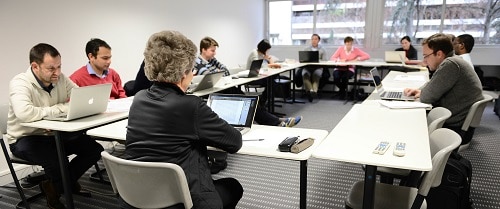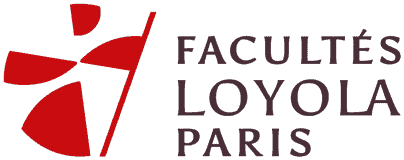Studies

Canonical courses in Philosophy and Theology
The canonical degrees delivered by the Facultés Loyola Paris conform to the requirements of the Holy See, and are accredited according to the European Credit Transfer System under the Bologna Accord (60 ECTS per year). Their level is recognised by the French state: the baccalaureate as equivalent to a French licence and the licentiate as equivalent to a Master.
CANONICAL BACCALAUREATE (Bachelors level)

CANONICAL LICENCIATE (Masters level)
The licenciate enables students to deepen their philosophical and theological culture while beginning to specialise.
Two possible programs:
- A 2-year (full-time) or 3-year (part-time) canonical licentiate.
- A double canonical licentiate (theology and philosophy) in 3 years, under certain conditions.
Students can choose:
- A personalized curriculum based on a specialization.
- One of a range of courses: two in ethics (biomedical ethics, social and environmental ethics) and two in theology (ecumenical theology, theology of listening to the poor).
Areas of specialisation:
CANONICAL BACHELOR’S DEGREE IN PHILOSOPHY
- History of philosophy
- Philosophy, mysticism and religion
- Moral and political philosophy
LICENTIATE IN THEOLOGY
- Biblical theology
- Fundamental and dogmatic theology
- Moral theology
- Patristic theology
- Practical theology
- Spiritual theology
The possibility of taking an “Ignatian instructor” course at the same time as the canonical bachelor’s degree
It is possible to follow an “Ignatian instructor” program at the same time as the canonical licentiate. The aim of this course is to prepare students for training and teaching, since the canonical licentiate entitles students to teach (Licentia Docendi).
CANONICAL DOCTORATE
Areas of specialisation:
CANONICAL DOCTORATE IN PHILOSOPHY
- Morality, politics and anthropology
- Philosophy, mysticism and religion
- History of philosophy
CANONICAL DOCTORATE IN THEOLOGY
- Biblical theology
- Fundamental and dogmatic theology
- Patristic theology
- Moral and practical theology
- Theology of interreligious dialogue
- History and theology of spirituality and religious life
POST-DOC
The Facultés Loyola Paris offer researchers the opportunity to follow a post-doctoral programme for a period of one year, leading to an additional research qualification.
INTER-MONASTIC THEOLOGICAL STUDIUM (STIM)
This programme aims to provide a theological formation adapted to the needs of monastic communities. The Facultés Loyola Paris validate the degree element (STIM-bac).
Programmes and diplomas
“CROIRE ET COMPRENDRE”: a programme tailored to people’s needs
An interdisciplinary course of study at university level over 1, 2 or 3 years, open to people of all ages, from all walks of life, from any country in the world, full time (16 hours per week) or part time (8 hours per week). The students can attend the formation classroom-based or full e-learning.
2 available pathways:
- LIBERTE: a selection of courses from the wide range offered by the Facultés Loyola Paris, adjusted to the individual’s needs
- FONDAMENTAL: a selection of introductory courses in philosophy and theology (biblical, fundamental and dogmatic, moral and practical, history of the Church spirituality, interreligious dialogue…)
Diploma in integral Ecology in partnership with Institut Catholique de Lille
A one-year part-time program to enable students or people committed to socio-ecological transformation to enhance their knowledge through an interdisciplinary approach (life sciences, economics, anthropology and philosophy, ethics, spirituality, theology). It also aims to enable them to mobilize new players in collective integral ecology projects. An important place is given to tutoring and discernment.
Diploma in Biomedical Ethics in partnership with Institut Catholique de Paris
A one-year part-time program exploring the many ethical questions posed by modern medicine and nursing, and the implications of the new biotechnologies. Open to all, but of particular relevance to professionals in medicine and related fields. An important place is given to tutoring and discernment.
Diploma “Humanities and politics” in partnership with Institut catholique de Lille and the think tank Esprit civique
A one-year part-time interdisciplinary programme in human sciences and political science to give roots and rejuvenate the will to improve our society. The pedagogy mixes theory and practice. The students meet many committed people and intiatives. An important place is given to tutoring and discernment.
Diploma in School Chaplaincy
A part-time ignatian and university programme over two years in line with the French national training framework in Catholic education.
Programme for Religious Formators
A one-year full-time course for male and female religious preparing to take on formation responsibility within their congregations.
“Ignatian instructor” program
This original course is at the crossroads of the Jesuit teaching tradition and contemporary adult education methods. It is aimed in particular at students who hold (or are preparing to hold) a graduate degree in theology or philosophy, and who wish to enter the teaching profession. It can be taken in parallel with studies or a professional activity.
Courses and lectures
All are welcome to follow a wide variety of courses and lectures without pursuing a degree.
Examples of teaching areas: Philosophy, Ethics, Cultures and languages, Biblical studies, Systematic theology, Practical theology, History of Christianity, Spirituality and consecrated life, World Religions…
Online courses
The Facultés Loyola Paris are developing french speaking online courses, involving personal and group work available on a digital platform, with facilitation from a member of the teaching staff by videoconference.


